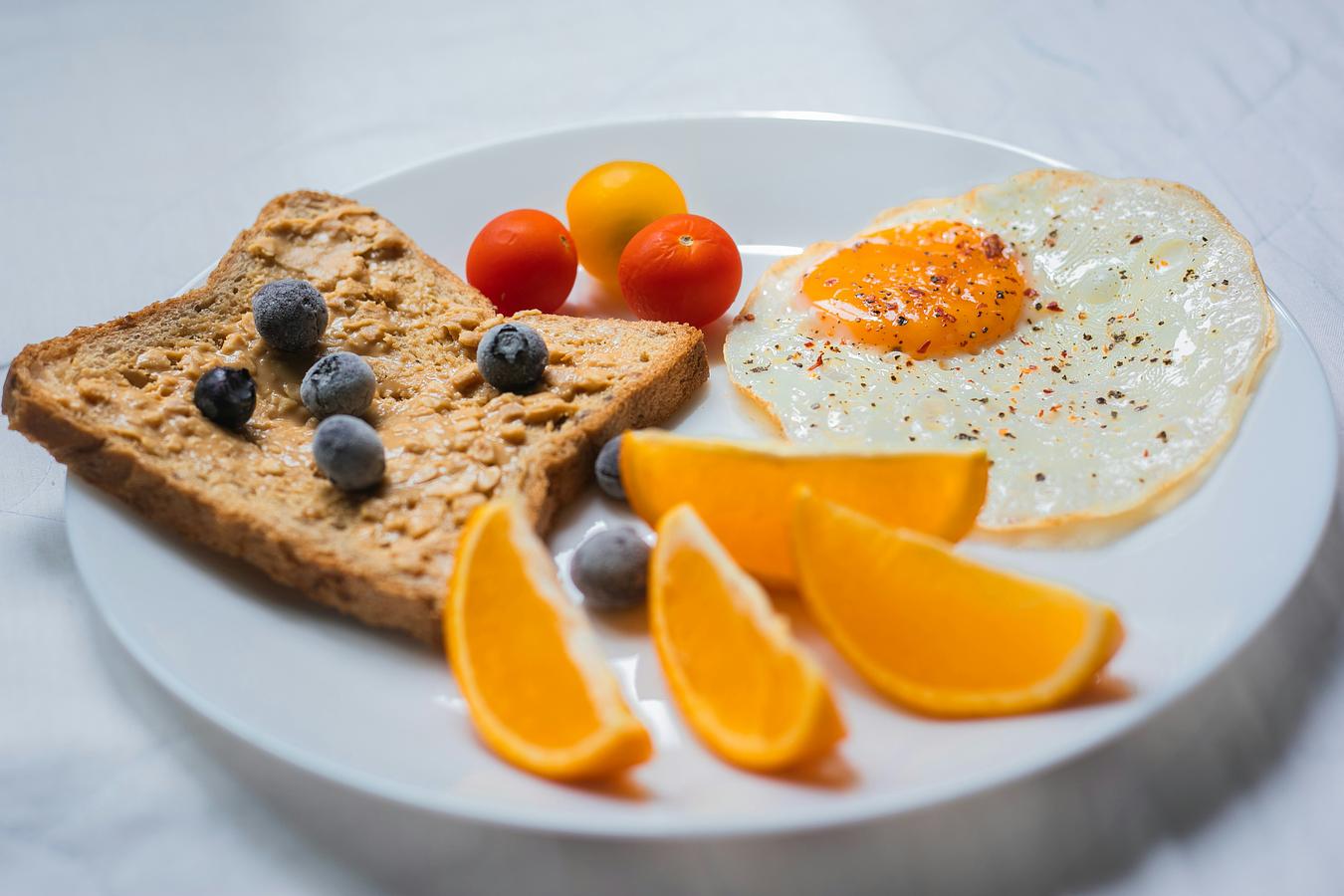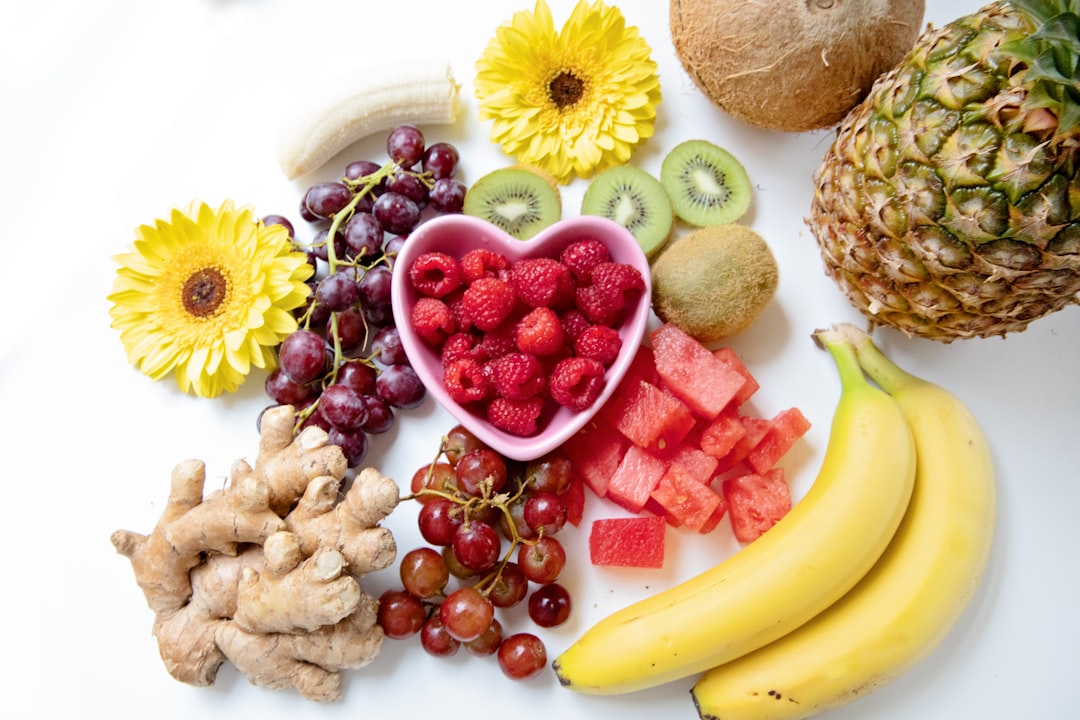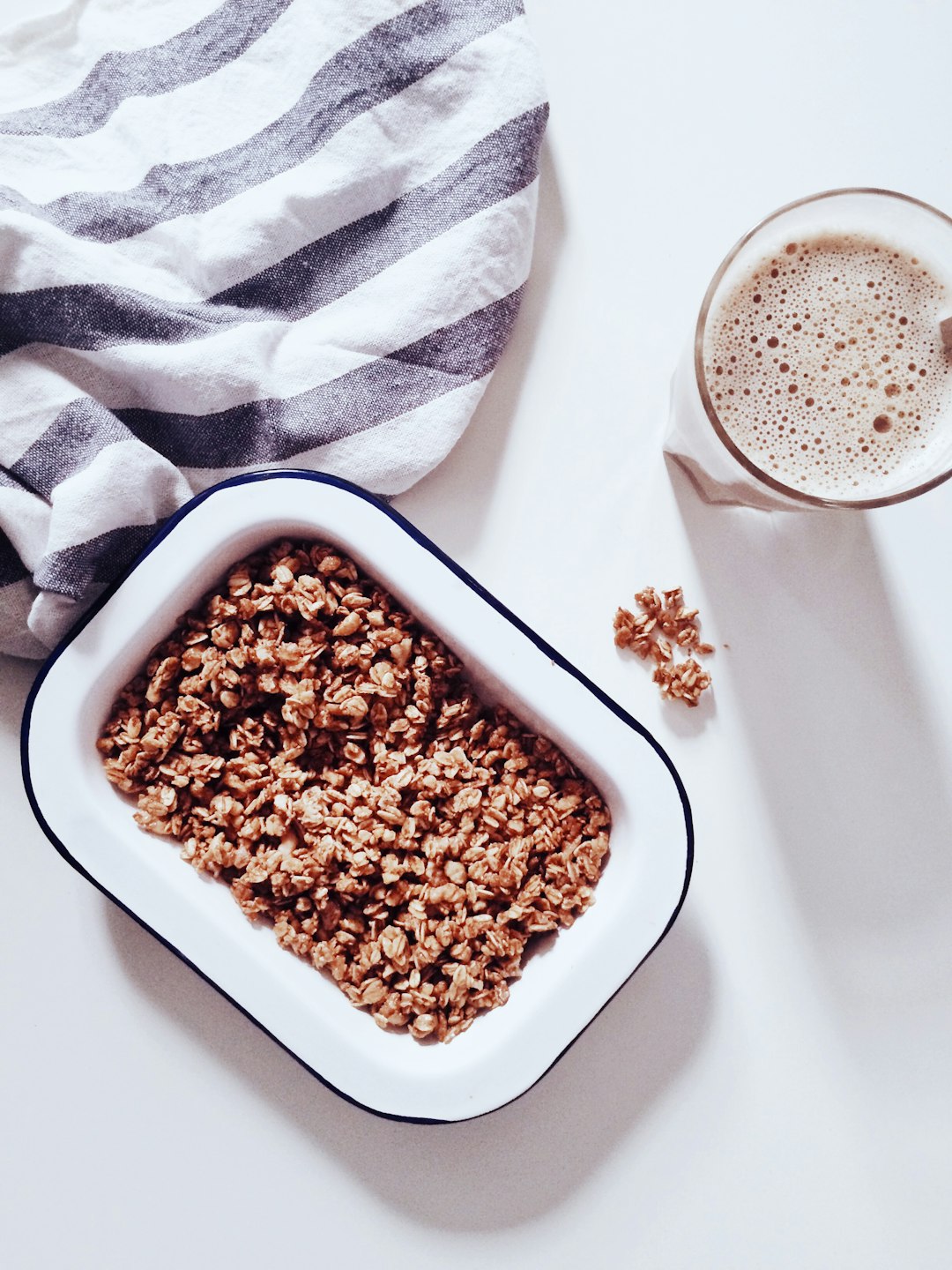
Your brain runs almost entirely on glucose, and after 8 hours of sleep, those fuel stores are nearly empty. Walking into an exam on an empty stomach is like trying to drive across town with your gas light on—you might make it, but you're taking an unnecessary risk.
The right breakfast combines slow-release carbohydrates with protein to keep your blood sugar steady for hours, not minutes. This guide covers which foods support focus and memory, what to avoid, timing strategies for different ages, and quick options when you're short on time.
Best breakfast before an exam
The ideal breakfast before a test pairs slow-release carbohydrates with protein. Picture oatmeal topped with berries and almonds, or whole-grain toast alongside scrambled eggs. This combination keeps your blood sugar steady for hours rather than spiking and crashing like it would after a bowl of Frosted Flakes or a chocolate muffin.
Eating this type of meal 1-2 hours before your test gives your body time to digest while maintaining energy during the exam. Your brain runs almost entirely on glucose, which comes from the carbohydrates you eat. When you choose whole grains instead of refined ones, that glucose enters your bloodstream gradually rather than all at once.
The protein part matters just as much. Eggs, yogurt, or nut butter slow down how quickly your body processes those carbohydrates. Think of protein as a time-release mechanism that makes your breakfast last longer.
Oatmeal with berries and almonds
A bowl of steel-cut or rolled oats releases energy slowly because the fiber in whole oats takes time to break down. This means your brain gets a steady fuel supply throughout your exam instead of running out of gas halfway through. Blueberries and strawberries add antioxidants that support memory, while sliced almonds contribute healthy fats and extra protein.
You can make this breakfast in about 10 minutes, or prepare overnight oats the evening before if mornings feel rushed. Either way, you're looking at a meal that holds you over for 3-4 hours without making you feel heavy or tired.
Veggie omelette on whole grain toast
Eggs deliver complete protein plus choline, a nutrient directly involved in memory formation. When you're trying to recall formulas or historical dates during an exam, choline helps your brain cells communicate more effectively. Adding vegetables like spinach, tomatoes, or bell peppers brings in vitamins and minerals that support clear thinking.
Whole grain toast provides those important complex carbohydrates your brain needs for sustained energy. A small piece of fruit on the side adds natural sweetness and extra vitamins without overloading you with food right before a big test.
Greek yogurt parfait with granola
Greek yogurt contains nearly twice the protein of regular yogurt, which helps maintain stable energy and keeps hunger away during long exams. Layer it with low-sugar granola and fresh fruit for a breakfast that tastes good and supports your brain. Check the granola label though, since many brands pack in as much sugar as candy bars.
A drizzle of honey or sprinkle of chia seeds adds nutrients without overwhelming your system. This option works especially well if you prefer lighter breakfasts or feel too nervous to eat something heavy.
Why eating breakfast boosts test scores
Students who eat breakfast perform better on exams than students who skip it. After sleeping for 8 hours, your brain has used up its glucose stores, which are the primary fuel for concentration, memory, and problem-solving. Showing up to a test without eating is like trying to drive a car with an empty tank.
Breakfast eaters show improved attention span, better short-term memory, and faster processing speeds compared to hungry students. Even mild hunger creates a distraction that pulls focus away from exam questions. Your stomach starts growling, you think about lunch, and suddenly you've read the same math problem three times without understanding it.
The type of breakfast matters as much as eating one at all. A balanced meal with protein, complex carbohydrates, and healthy fats provides 3-4 hours of sustained energy. A sugary breakfast bar or sweetened coffee drink might give you 30-45 minutes of alertness before your blood sugar crashes and you feel worse than before.
Key nutrients your brain needs on exam morning

Your brain accounts for only 2% of your body weight but uses about 20% of your daily energy. On test day, certain nutrients become especially important for staying sharp and focused.
Protein for sustained energy
Protein breaks down into amino acids that help produce neurotransmitters, which are chemical messengers allowing your brain cells to communicate. When you include eggs, Greek yogurt, or nut butter in your breakfast, you're giving your body the building blocks for mental alertness. Protein also slows down how quickly your body absorbs carbohydrates, preventing the blood sugar spikes and crashes that derail focus mid-test.
Complex carbohydrates for steady glucose
Your brain runs almost exclusively on glucose, but not all carbohydrate sources deliver it the same way. Whole grains, oats, and quinoa release glucose gradually over several hours. White bread, sugary cereals, and pastries flood your system quickly and then disappear, leaving you foggy and tired.
Think of complex carbohydrates as a slow-burning log in a fireplace. Simple carbs are more like crumpled newspaper—they flare up bright for a moment, then burn out fast.
Healthy fats for memory
Omega-3 fatty acids found in walnuts, chia seeds, and flaxseed support the structure of brain cell membranes. The membranes are like walls around each cell, and when those walls work properly, signals travel faster and more efficiently. Omega-3s also help reduce inflammation, which can interfere with clear thinking.
You won't see dramatic effects from a single breakfast, but regularly including healthy fats supports overall brain function. Even a tablespoon of ground flaxseed in your oatmeal or a handful of walnuts alongside your yogurt makes a difference.
Vitamins and minerals for mental clarity
B vitamins help convert food into energy your brain can actually use, while iron carries oxygen to brain tissue. Both are essential for staying alert during long exams. Minerals like magnesium and zinc support neurotransmitter function and can help manage test-day stress.
You'll find B vitamins and iron naturally in whole foods like leafy greens, eggs, nuts, and whole grains. Processed breakfast options like Pop-Tarts or sugary cereals have been stripped of most nutrients, even if the box claims they're "fortified."
Best foods before a test and why they work
Certain foods have earned their reputation as brain-boosters through research and real results. Knowing why specific foods work helps you make smarter choices on test morning.
Eggs
One large egg contains about 6 grams of protein and 147 milligrams of choline, making eggs one of the most concentrated food sources of this memory-supporting nutrient. Choline helps produce acetylcholine, a neurotransmitter involved in learning and recall. Whether you prefer scrambled, hard-boiled, or in an omelette, eggs fit into almost any morning routine.
Oats and other whole grains
Whole grain oats contain beta-glucan fiber that slows digestion and provides hours of steady energy. Unlike instant oatmeal packets loaded with added sugars, steel-cut or rolled oats give you the full benefit of the grain's natural nutrients. Whole grain bread, brown rice, or quinoa work similarly, releasing glucose at a pace that matches your brain's needs during extended concentration.
Bananas and berries
Bananas provide quick natural energy from fruit sugars while also delivering potassium, which supports nerve function and helps your brain send signals efficiently. Berries, especially blueberries, contain flavonoids linked to improved memory. Adding either or both to your breakfast gives you natural sweetness without the downsides of refined sugar.
Leafy greens
Spinach, kale, and other dark leafy greens contain folate and iron that support oxygen delivery to your brain. Most students don't think of vegetables as breakfast food, but adding a handful of spinach to scrambled eggs or blending some into a smoothie takes minimal effort. Leafy greens also provide vitamin K, which has been associated with better cognitive function.
Nuts and seeds
A small handful of almonds, walnuts, or pumpkin seeds delivers protein, healthy fats, and magnesium in a portable package. Nuts provide sustained energy without weighing you down, and their healthy fat content helps you absorb fat-soluble vitamins from other foods. Just watch your portion sizes—a serving is typically about ¼ cup or roughly what fits in your palm.
Drinks to help you focus and stay calm
What you drink on test morning can be just as important as what you eat. Hydration and strategic beverage choices support concentration and help manage pre-test nerves.
Water
Even mild dehydration—as little as 2% below optimal hydration—can impair attention, memory, and motor skills. Starting your day with a full glass of water and continuing to sip throughout the morning ensures your brain has the fluid it needs. Bring a water bottle to the exam if allowed, since staying hydrated during the test matters too.
Green or black tea
Tea provides moderate caffeine for alertness along with L-theanine, an amino acid that promotes calm focus without jitters. L-theanine is what makes tea feel different from coffee—you get the mental boost without the shaky, anxious feeling. A cup of tea with breakfast gives you about 25-50 mg of caffeine, which is enough to enhance concentration without overdoing it.
Limited coffee or espresso
If you're a regular coffee drinker, having your usual morning cup helps you feel normal and alert on test day. However, test morning isn't the time to experiment with extra shots or larger sizes than you're used to. Too much caffeine can increase anxiety and cause shaky hands, which makes bubbling in answer sheets or writing essays more difficult.
Stick to your typical amount, and have it with food rather than on an empty stomach. Coffee hits harder when there's nothing else in your system to buffer it.
Smoothies
A well-designed smoothie can pack multiple brain-supporting nutrients into a drinkable breakfast that's easy to consume even when you're nervous. Blend Greek yogurt or milk with frozen berries, a handful of spinach, and a tablespoon of nut butter for a balanced meal. Smoothies work especially well if you tend to feel too anxious to eat solid food before big tests.
Foods and habits to avoid on test day
Knowing what not to eat can be just as valuable as knowing what to include. Certain foods and eating patterns actively work against your performance.
Sugary pastries and cereals
Donuts, muffins, and sweetened cereals cause your blood sugar to spike rapidly, which triggers your pancreas to release insulin. Insulin brings blood sugar back down, but often overshoots, leaving you feeling tired and unfocused. This crash typically happens 1-2 hours after eating, which could land right in the middle of your exam.
The temporary energy boost isn't worth the cognitive slump that follows. You might feel great walking into the testing room, then find yourself struggling to keep your eyes open 45 minutes later.
Energy drinks
Most energy drinks contain 150-300 mg of caffeine plus high amounts of sugar, creating a combination that can leave you jittery, anxious, and ultimately more tired. The sugar and caffeine together can also cause stomach upset and make it harder to concentrate on complex questions. If you feel you need caffeine, tea or coffee with breakfast offers a more moderate and manageable boost.
Heavy greasy foods
Bacon cheeseburgers or fast-food breakfast sandwiches high in saturated fat make you feel sluggish because your body diverts energy toward digestion rather than brain function. Heavy meals also sit uncomfortably in your stomach, creating physical discomfort that becomes one more distraction during your test. Save the indulgent meals for after your exam when you're celebrating.
Skipping breakfast
Arriving at a test on an empty stomach might seem like a way to avoid nervous stomach issues, but it typically backfires. Hunger creates its own form of stress on your body, triggering the release of cortisol and making it harder to manage test anxiety. Even if you can only manage something small, eating a banana with a handful of nuts beats showing up hungry.
Timing and portion tips for different ages
Test-takers of different ages have varying nutritional needs and schedules. Tailoring your approach to your life stage makes breakfast feel more manageable.
Elementary students
Younger students typically need smaller portions but benefit from the same balanced approach of protein plus complex carbs. A half-cup of oatmeal with berries, or one egg with a slice of whole grain toast, provides enough fuel without overwhelming a smaller appetite. Aim to eat 30-60 minutes before leaving for school to allow time for digestion and avoid stomach discomfort.
High school students
Teenagers often have early start times and busy schedules that make sit-down breakfasts challenging. Portable options like overnight oats in a jar, a whole grain wrap with peanut butter and banana, or a smoothie can be consumed on the way to school while still providing necessary nutrients. On standardized test days like the SAT or ACT, eating 1-2 hours before the exam starts helps ensure energy lasts through multiple sections.
College and adult learners
Adult test-takers preparing for professional exams or returning to school often juggle multiple responsibilities that can push breakfast aside. Planning and preparing components the night before—hard-boiling eggs, portioning out nuts, or setting up overnight oats—removes morning decision-making when you're already feeling stressed. Adults may also need slightly larger portions to sustain energy through longer exams, though individual needs vary based on metabolism and activity level.
Five grab-and-go breakfast ideas for busy students

When time is tight but nutrition still matters, quick options can deliver brain-supporting nutrients without requiring extensive preparation.
Overnight oats jar: Combine ½ cup rolled oats, ½ cup milk, 2 tablespoons Greek yogurt, and 1 tablespoon chia seeds in a mason jar the night before. In the morning, top with fresh berries and a sprinkle of chopped almonds or walnuts. This no-cook option takes 5 minutes to assemble and provides protein, complex carbs, and omega-3s.
Peanut butter banana wrap: Spread 2 tablespoons of natural peanut butter on a whole wheat tortilla, place a peeled banana in the center, and roll it up. This combination delivers protein, healthy fats, potassium, and complex carbohydrates in a package you can eat with one hand. For variety, try almond butter or add a drizzle of honey.
Hard-boiled egg snack box: Prepare hard-boiled eggs on Sunday evening and store them in the refrigerator for the week ahead. On test morning, grab 2 eggs along with a handful of whole grain crackers and an apple for a balanced breakfast that requires zero cooking. This option works especially well if you prefer savory breakfasts over sweet ones.
Fruit and yogurt smoothie pack: Pre-portion smoothie ingredients in freezer bags—1 cup frozen berries, 1 handful spinach, and 2 tablespoons oats per bag. In the morning, dump one bag into a blender with 1 cup milk and ½ cup Greek yogurt, blend for 60 seconds, and pour into a travel cup. The frozen components mean you can blend and go in under 2 minutes.
Whole grain muffin with cheese stick: Choose or bake muffins made with whole wheat flour, oats, and minimal added sugar—options with nuts, seeds, or fruit work well. Pair one muffin with a string cheese or small container of cottage cheese for protein, and you have a breakfast that travels easily and provides sustained energy.
Three-day exam week breakfast planner
Strategic planning during intensive testing periods helps maintain consistent energy and reduces morning stress when you're already feeling the pressure of upcoming exams.
Day 1 practice test morning
Start with a familiar breakfast you've eaten many times before. This isn't the day to try new foods that might upset your stomach. A bowl of your regular cereal with milk and a banana, or your usual eggs and toast, helps establish a routine you can repeat on actual test day.
Pay attention to how you feel 2-3 hours after eating to gauge whether this meal sustains you adequately. If you feel hungry or tired before the practice test ends, you'll know to adjust portions or add more protein for the real exam.
Day 2 night-before prep
Use this evening to prepare components for the next morning's breakfast. Hard-boil eggs, portion out overnight oats, or pre-measure smoothie ingredients so you're not making decisions when you're tired and anxious. Lay out any dishes, utensils, or containers you'll need.
This preparation work removes friction from your morning routine and helps you feel more in control. When test day arrives, you'll just grab what you prepared rather than standing in front of the fridge wondering what to eat.
Day 3 big test morning
Stick with the breakfast that worked during your practice run, eating at the same time you did before. Avoid trying anything new or eating significantly more or less than usual, since your body performs best when it knows what to expect. Bring a small snack like a granola bar or handful of nuts if you're allowed to have food during breaks.
Small steps, big results with TutorLyft support
Eating a brain-supporting breakfast is just one piece of test preparation, but it's a piece you have complete control over. While you can't change the questions that will appear on your exam, you can give your brain the fuel it needs to access everything you've studied.
The difference between showing up well-nourished versus hungry and distracted can translate to clearer thinking, better recall, and improved performance. At TutorLyft, we understand that academic success comes from supporting students in every aspect of their learning journey—from finding the right tutor who can help you master difficult concepts to developing practical strategies like proper test-day nutrition.















































































